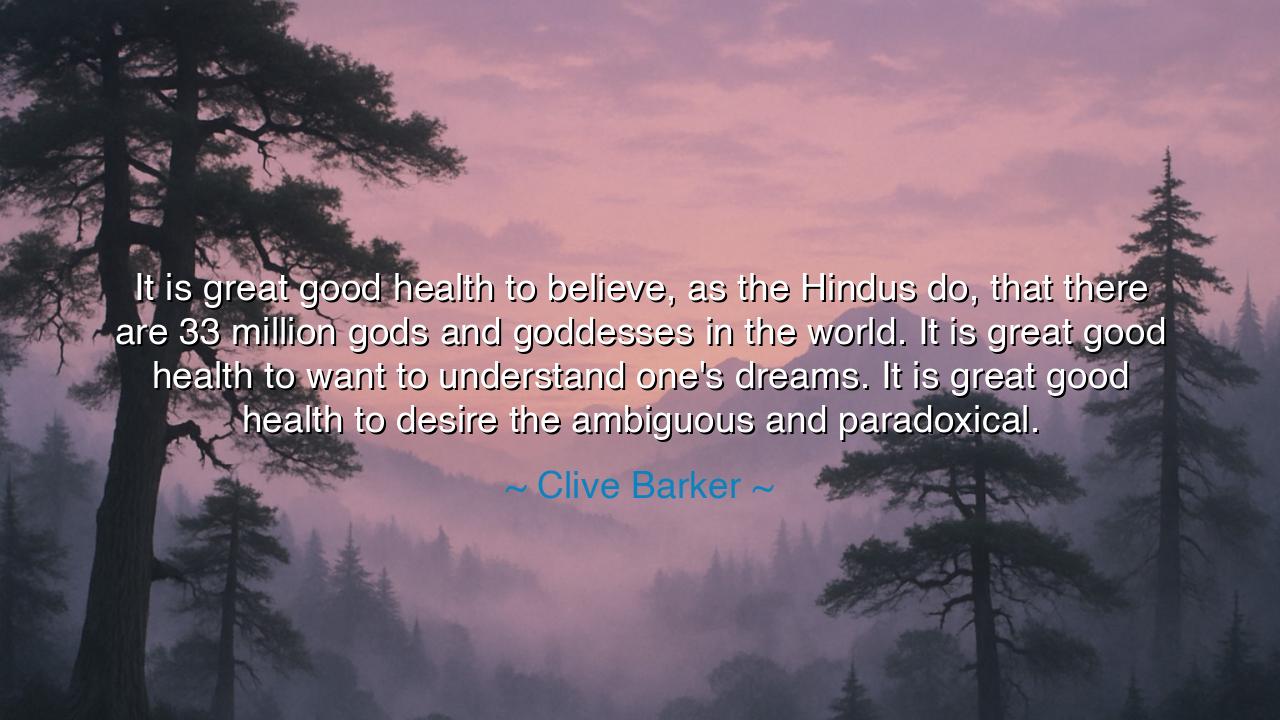
It is great good health to believe, as the Hindus do, that there
It is great good health to believe, as the Hindus do, that there are 33 million gods and goddesses in the world. It is great good health to want to understand one's dreams. It is great good health to desire the ambiguous and paradoxical.






Hearken, O children of generations yet unborn, and attend to the words of Clive Barker, who spoke with the wisdom of one attuned to both the seen and unseen realms: “It is great good health to believe, as the Hindus do, that there are 33 million gods and goddesses in the world. It is great good health to want to understand one's dreams. It is great good health to desire the ambiguous and paradoxical.” In these words lies a meditation on openness, imagination, and the nourishment of the soul, a truth as ancient as the teachings of seers, philosophers, and mystics who sought to reconcile life’s mysteries with the human spirit.
Consider first the health of belief and reverence. Barker notes that to embrace the multitude of deities, as in the Hindu tradition, is to cultivate a mind attuned to wonder, diversity, and the interconnectedness of existence. Ancient civilizations—from the polytheistic temples of Egypt to the pantheons of Greece—understood that belief and ritual nourish not merely the spirit, but also the mind and heart, grounding human purpose in a cosmos larger than oneself. Faith, in its many forms, is a tonic for vitality.
The reflection on understanding one’s dreams highlights the importance of introspection and the subconscious in human health. Dreams are the portals through which the mind speaks to itself, revealing fears, desires, and hidden truths. Consider Aristotle, who wrote of dreams as instruments for understanding the soul and guiding ethical action. Barker’s words remind us that curiosity about one’s inner life cultivates clarity, emotional balance, and a harmony between action and thought. To explore dreams is to explore the self.
Barker also elevates the desire for the ambiguous and paradoxical. Life is rarely clear-cut; it is woven of contradictions, mysteries, and multiple perspectives. The philosophers of old, from Heraclitus to the sages of the Upanishads, celebrated paradox as the engine of reflection and growth. To desire the ambiguous is to embrace complexity, to cultivate patience, and to develop the resilience to navigate uncertainty. Such desire nourishes mental and emotional health, for it teaches flexibility and humility.
Consider the story of the poet Rumi, who danced with paradox in his verses, celebrating the union of love and sorrow, light and shadow. His embrace of ambiguity allowed him to perceive life’s depth and convey profound truths across generations. Barker echoes this principle: openness to multiplicity, paradox, and mystery cultivates not confusion, but wisdom and vitality.
From this reflection emerges a timeless lesson: true health is not merely the absence of ailment, but the cultivation of a mind and spirit attuned to wonder, introspection, and the richness of complexity. Barker reminds us that imagination, curiosity, and reverence are as essential to well-being as diet or exercise, for they nourish the soul and strengthen the capacity to endure life’s trials.
Practical action flows naturally from this wisdom. Engage with your dreams through journaling, meditation, or reflection. Explore diverse beliefs and philosophies with openness and respect. Celebrate ambiguity in art, thought, and daily life, resisting the urge for rigid certainty. By embracing multiplicity, introspection, and paradox, you cultivate a vitality that sustains both mind and spirit.
Finally, remember the eternal truth: human life is enriched when we seek not only to survive, but to wonder, reflect, and embrace complexity. Clive Barker’s words are a clarion call: cherish belief, explore your inner world, and welcome the ambiguous and paradoxical, for in doing so, you cultivate a health of mind and spirit that endures across all trials and generations.
If you wish, I can also craft a narration-ready version of this reflection, with rhythmic rises and falls that evoke the wonder, mystery, and timeless wisdom of Barker’s insight.






AAdministratorAdministrator
Welcome, honored guests. Please leave a comment, we will respond soon